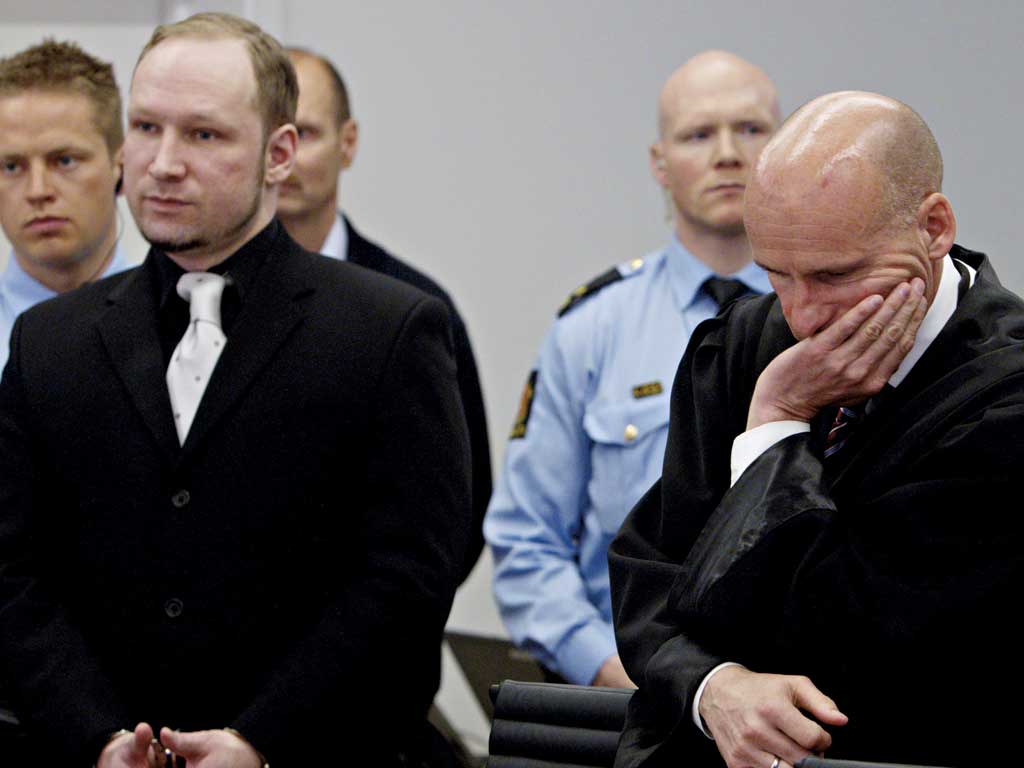Your support helps us to tell the story
From reproductive rights to climate change to Big Tech, The Independent is on the ground when the story is developing. Whether it's investigating the financials of Elon Musk's pro-Trump PAC or producing our latest documentary, 'The A Word', which shines a light on the American women fighting for reproductive rights, we know how important it is to parse out the facts from the messaging.
At such a critical moment in US history, we need reporters on the ground. Your donation allows us to keep sending journalists to speak to both sides of the story.
The Independent is trusted by Americans across the entire political spectrum. And unlike many other quality news outlets, we choose not to lock Americans out of our reporting and analysis with paywalls. We believe quality journalism should be available to everyone, paid for by those who can afford it.
Your support makes all the difference.Anders Breivik acquired the knowledge to carry out a bomb and shooting rampage on the internet, he told a Norwegian court today.
He said he studied case studies of al-Qa'ida and other attacks and read more than 600 bomb-making guides.
On day five of his trial in Oslo, the confessed mass killer said he studied the 1993 bombing of the World Trade Centre in New York and Timothy McVeigh's Oklahoma City bombing in 1995 in particular.
Breivik said of al-Qa'ida: "I have studied each one of their actions, what they have done wrong, what they have done right."
He has admitted the July 22 attacks that killed 77 people, but pleaded not guilty to criminal charges, saying his victims had betrayed Norway by embracing immigration.
Breivik said of al-Qa'ida: "I have studied each one of their actions, what they have done wrong, what they have done right."
He called the Islamist group "the most successful revolutionary movement in the world" and said it should serve as an inspiration to far-right militants, even though their goals are different.
"We want to create a European version of al-Qa'ida," Breivik said.
Breivik has admitted to the July 22 attacks that killed 77 in Norway, but pleaded not guilty to criminal charges, saying his victims had betrayed Norway by embracing immigration.
His lack of remorse and matter-of-fact description of weapons and tactics during his testimony have deeply disturbed families of the victims, most of whom were teenagers.
The 33-year-old Norwegian said he was deliberately using "technical" language as a way to keep his composure.
"These are gruesome acts, barbaric acts," he said.
"If I had tried to use a more normal language I don't think I would have been able to talk about it at all."
A lawyer representing the bereaved, who are watching the proceedings in the Oslo court and in 17 other courtrooms in Norway, asked Breivik why he did not show any empathy for his victims.
"I can choose to remove the mental shield, but I am choosing not to do it ... because I would not survive," he said.
Comparing himself to a Japanese "banzai" warrior during the Second World War, Breivik said too many Norwegian men were "feminised, cooking food and showing emotions".
The victims' lawyer noted that he showed emotions on the first day of the trial, when he cried as prosecutors showed an anti-Muslim video he had created.
"I wasn't prepared for that film," Breivik said. "It's a film that represents the fight and everything I love."
Breivik has admitted to the bombing in Oslo that killed eight people and the shooting massacre at the Labour Party youth camp that left 69 dead.
He claims to belong to an alleged anti-Muslim "Knights Templar" network. Many groups claim part of that name, but prosecutors say they do not believe the group described by Breivik exists.
The main goal of the trial is to figure out whether Breivik is sane or insane.
If declared sane, Breivik could face a maximum 21-year prison sentence or an alternate custody arrangement that would keep him locked up as long as he is considered a menace to society.
If found insane, he would be committed to psychiatric care for as long as he is considered ill.

Join our commenting forum
Join thought-provoking conversations, follow other Independent readers and see their replies
Comments